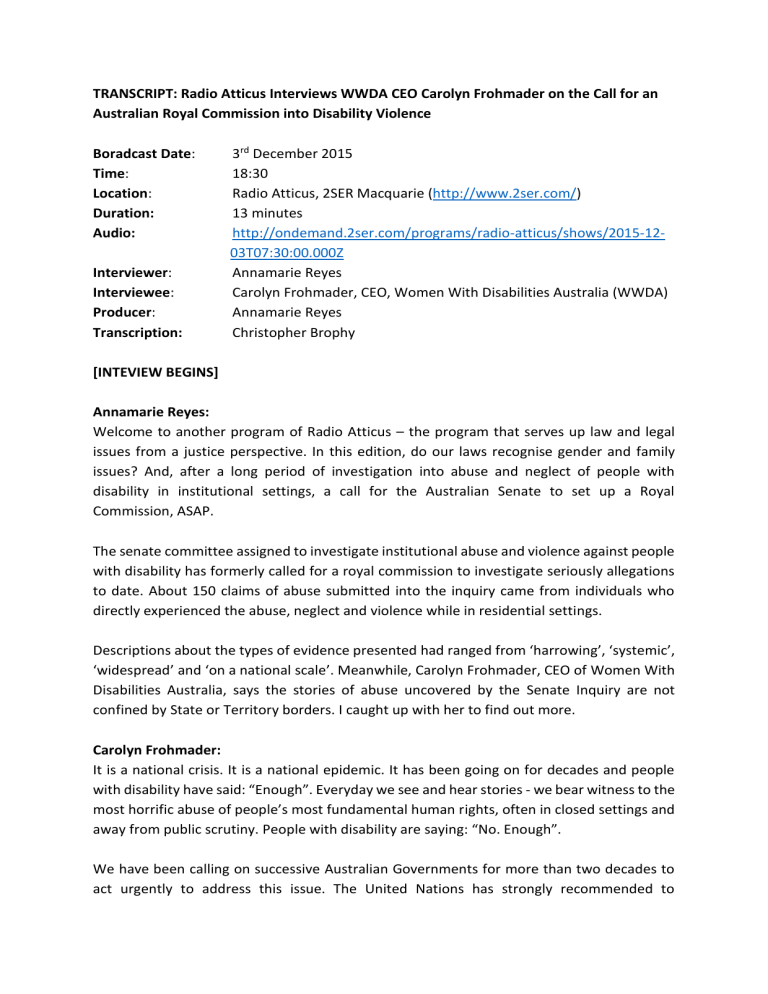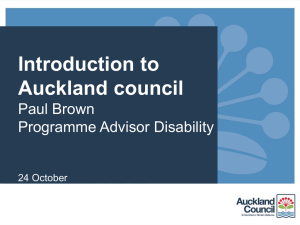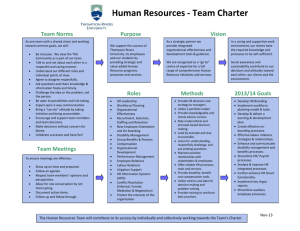a transcript (DOC) - Women With Disabilities Australia

TRANSCRIPT: Radio Atticus Interviews WWDA CEO Carolyn Frohmader on the Call for an
Australian Royal Commission into Disability Violence
Boradcast Date: 3 rd December 2015
Time:
Location:
Duration:
Audio:
18:30
Radio Atticus, 2SER Macquarie (
13 minutes http://www.2ser.com/ )
Interviewer:
Interviewee: http://ondemand.2ser.com/programs/radio-atticus/shows/2015-12-
03T07:30:00.000Z
Annamarie Reyes
Carolyn Frohmader, CEO, Women With Disabilities Australia (WWDA)
Producer:
Transcription:
[INTEVIEW BEGINS]
Annamarie Reyes
Christopher Brophy
Annamarie Reyes:
Welcome to another program of Radio Atticus – the program that serves up law and legal issues from a justice perspective. In this edition, do our laws recognise gender and family issues? And, after a long period of investigation into abuse and neglect of people with disability in institutional settings, a call for the Australian Senate to set up a Royal
Commission, ASAP.
The senate committee assigned to investigate institutional abuse and violence against people with disability has formerly called for a royal commission to investigate seriously allegations to date. About 150 claims of abuse submitted into the inquiry came from individuals who directly experienced the abuse, neglect and violence while in residential settings.
Descriptions about the types of evidence presented had ranged from ‘harrowing’, ‘systemic’,
‘widespread’ and ‘on a national scale’. Meanwhile, Carolyn Frohmader, CEO of Women With
Disabilities Australia, says the stories of abuse uncovered by the Senate Inquiry are not confined by State or Territory borders. I caught up with her to find out more.
Carolyn Frohmader:
It is a national crisis. It is a national epidemic. It has been going on for decades and people with disability have said: “Enough”. Everyday we see and hear stories - we bear witness to the most horrific abuse of people’s most fundamental human rights, often in closed settings and away from public scrutiny. People with disability are saying: “No. Enough”.
We have been calling on successive Australian Governments for more than two decades to act urgently to address this issue. The United Nations has strongly recommended to
successive Australian governments for well over a decade that they need to act urgently to address violence and abuse against people with disability, particularly those in institutional and residential settings and particularly, recognise the gendered nature of that violence, looking specifically at what that means for women and girls with disability. We know incidence of all forms of violence against women and girls with disability are staggeringly high.
AR:
When you say, ‘gendered nature of disability abuse’, can you explain a little bit more and gives us some examples?
CF:
Sadly, it is a fact that women with disability are over-represented in any set of data that you might choose to look at. We know for example that women with disability are 40% more likely to experience domestic violence. We know that 70% of women with disability have experienced sexual violence in their lifetime. We know that a quarter of rape cases reported in Australia are against women with disability, and that’s just the statistics. There is an inherent problem with statistics and data collection in Australia because in many of the settings where violence against women with disabilities occurs the data is very poor and is not captured. So, if you are looking at things like violence against Aboriginal women with disability, we have no data.
AR:
Quite worrying and scary when you think about it. But, what is it so particular about women with disability and young girls with disability that makes them so vulnerable in these situations?
CF:
I don’t often like to use the word ‘vulnerable’ or ‘vulnerability’ because that in a way puts the onus back on the individual, and I think that we’re talking here about women with disability being much more ‘at risk’ of all forms of violence. When I say ‘all forms of violence’, I am also talking about things like forced sterilisation; forced contraception; menstrual suppression; forced abortion; removal of children and babies from mothers with disability – particularly mothers with intellectual disability; and in institutional settings we’re talking about a very high rate of sexual violence against women with disability.
In terms of why the perpetrators target women with disability: for a whole range of reasons.
Obviously for many of the same reasons women without disability experience violence, but added on to that, when someone for example, may not be able to communicate, may not have any spoken language. Often women with intellectual disability are not believed when they report incidents of violence perpetrated against them and that’s also why they’re targeted. Our justice system does not deal well with women with intellectual disability or
women with psychosocial impairments because they’re often seen as not being credible witnesses, which is unforgivable. What it means is that when violence is perpetrated against women with disability, often the perpetrators get away with it.
AR:
I totally agree that the responsibility – it is not actually the people with disabilities’ problem.
Its mostly the settings that they’re around and the society in which this is allowed to take place. Like for example, institutions and residential settings. What is it about these settings that this happens unhampered or even unmonitored for a long long time?
CF:
The closed nature of those settings. The fact that they’re away from public scrutiny. The fact that often it can be the service providers or people who employed to care for people with disability who can be the perpetrator of the violence. There’s a whole litany of reasons. I think also too that what happens in those types of settings is – for anyone else, any other person, it would be conceived and conceptualised as a crime, but for people with disability, particularly women and girls in institutional and residential settings, what happens is that it’s reframed and called ‘a service incident’ or its called ‘abuse’, or its called ‘neglect’. Its not actually called violence. Its not called rape. Its not called and named up for what it is. And part of that is also to do with the fundamental devaluing of women with disability – that they are somehow other, that they are somehow different from other women and from other members of our community.
Its complex - there’s many factors but what we do have to do is see mainstream responses and mainstream services being much more inclusive of women and girls with disability, and addressing all forms of violence against women. Whilst at the moment there is obviously a great national discourse around domestic violence, it is still fairly narrowly understood as intimate partner violence. But, for a woman with a disability who lives in a group home or a supported accommodation facility, or a prison, or a respite centre, or a nursing home - that is there ‘domestic’ setting. Violence perpetrated against women with disability in those sorts of settings is ‘domestic violence’.
AR:
Senator Rachel Siewert has actually mentioned that Australia’s justice system needs to be improved by removing systemic barriers and access to things like the legal capacity of the women to be represented. Can you give us some examples of some of these systemic barriers that have been such a problem in the last years?
CF:
What we know is that, as I said before, women with disability are typically not believed. We also have problems stemming right from our police culture. I have actually been present with
women with disability when they have tried to report rape to police, only to be asked by police “do you think she’s making it up?”. So there are stereotypes and assumptions that are made about women with disability, particularly women with intellectual disability or psychosocial impairments that somehow they asked for it; that somehow they’re precocious; that somehow they’re oversexed. There’s all these stereotypes for a start.
We also have great difficulty when we don’t have enough support and services to support women with disability through the process of actually reporting the crimes that are perpetrated against them. We don’t have enough advocacy in this country. We don’t have enough legal advocacy. There are also great issues around how evidence is actually presented in courts - around things like cross-examinations. About for example, if somebody doesn’t have communication, they might want to give their evidence using text-to-speech technology.
We need to start looking at whole litany of things to make our justice system accessible and inclusive for everybody.
AR:
And that doesn’t even include actually training lawyers to become disability issues sensitive.
CF:
Exactly. I mean we do have some small pockets of programs in Australia. The Intellectual
Disability Rights Service in New South Wales has a very good program to support people with disability in terms of reporting crimes against them, however, as is the case in many areas of this country, there are programs like that that need to be rolled out nationally. Its no use just being in one state and only available to a portion of people.
There is lots of fragmentation, lots of work to do, but the Senate report is a very good start.
It is a step in the process, but what we are calling on now, and when I say we, I’m talking about people with disability, their families, their supporters, their allies – what we are calling on now is for all sides of Government to listen and do justice to those people with disability who gave evidence in that inquiry, often at great personal cost. This cannot be a political issue. We need national leadership to address this. We want that Royal Commission and we will not go away until we get it.
Interviewer:
If you could come up with at least three priorities that has to happen quickly as a result of this
Royal Commission?
Carolyn Frohmader:
Well, we want definitely want access to justice. That has to addressed as a matter of urgency.
All the sorts of issues that I talked about earlier. We also want, as a matter of urgency, - and its reflected in the Senate Committee report – we want a national statutory authority to
actually oversee and regulate and monitor and make sure that there is an independent oversight mechanism nationally. I think importantly, those are some of the bigger, more systemic issues, but fundamentally what we need is for resources to be directed toward people with disability themselves; to capacity building so that people with disability can learn about what constitutes violence, can understand that what is happening to them is wrong, to learn that it’s a crime, and that it is not something that they need to put up with. Many people with disability have had lifelong experiences of all forms of violence. For many they think that it’s normal. Whilst training of frontline workers is very critical – our police, our disability service providers etc. – we want to see much more attention directed toward building the skill and capacity of people with disability themselves.
AR:
CEO of Women With Disabilities Australia, Carolyn Frohmader, ending that interview.
[END]






